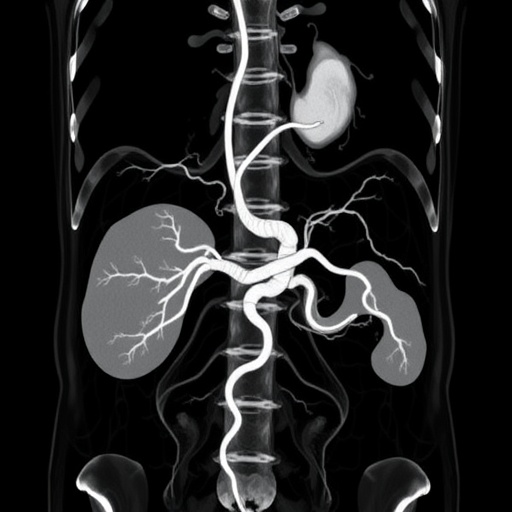Recent research has unveiled a crucial advancement in the prediction and management of abdominal aortic aneurysms (AAAs), a life-threatening vascular condition. The study underscores the importance of sex-specific machine learning classification models, revealing that these tailored approaches substantially enhance outcomes for patients affected by AAAs. This breakthrough offers a glimpse into the future of personalized medicine, where predictive algorithms can not only provide more accurate assessments but also inform treatment decisions on an individual basis.
Abdominal aortic aneurysms are characterized by an abnormal dilation of the aorta in the abdominal region, which can lead to life-threatening ruptures if not identified and monitored effectively. Traditional methods of predicting aneurysm outcomes have primarily relied on generalized models that do not take into account the biological differences between sexes. However, this new study highlights the shortcomings of such one-size-fits-all methodologies, advocating for a more nuanced approach that accounts for sex differences in the pathophysiology of AAAs.
In the pursuit of developing effective classification models, researchers employed advanced machine learning techniques to analyze vast datasets derived from AAA clinical records. By examining variables such as genetic predispositions, lifestyle risk factors, and physiological differences, the researchers were able to create models that exhibited improved predictive capabilities. These models have shown that men and women may respond differently to the same pathological processes, thus necessitating tailor-fit algorithms for better outcome predictions.
The significance of these findings hinges on the underlying premise of personalized medicine. By employing sex-specific models, it becomes possible to enhance care pathways, potentially leading to reduced rates of aneurysm rupture and better overall patient outcomes. Once merely theoretical, the integration of machine learning techniques into clinical practice is now taking center stage, showcasing its potential to revolutionize how medical professionals approach diseases like AAA.
Moreover, the research team meticulously validated their models against historical data, ensuring that the predictions were not only robust but also clinically relevant. This validation process involved extensive cross-validation techniques that empowered the study to demonstrate significant improvements in classification accuracy and prediction timelines. This meticulous attention to detail in the model’s development further emphasizes the reliability and utility of machine learning in clinical settings.
As researchers strive to bridge the gap between technology and traditional medicine, the incorporation of sex-specific data into machine learning algorithms marks a pivotal moment in the understanding and treatment of AAAs. The findings indicate that addressing gender disparities in medical research can lead to substantial improvements in diagnostic and therapeutic strategies, ultimately enhancing the standard of care for patients.
Furthermore, this research opens avenues for subsequent studies to investigate additional pathologies in a similar light. With the successful application of machine learning techniques to AAA, there is a pressing opportunity to explore other vascular conditions where sex differences may also influence disease progression and outcomes. The implications extend beyond the immediate study, fostering a broader paradigm shift in how we conceptualize and conduct medical research.
The evolving landscape of machine learning forecasts a future where predictive analytics can not only improve patient outcomes but also streamline healthcare systems. By facilitating early interventions based on accurate risk stratifications, healthcare providers can allocate resources more judiciously, enhancing both efficiency and efficacy in treatment approaches. This unprecedented capability aligns with the overarching goals of modern healthcare, which strives to optimize patient-centered care.
As the study unfolds, it raises important discussions about the viability and ethical considerations of employing artificial intelligence and machine learning in clinical environments. While the potential benefits are considerable, there remain pressing ethical questions regarding data privacy, algorithmic bias, and the transparency of machine learning processes. Addressing these issues will be paramount as the intersection of technology and healthcare continues to deepen.
In conclusion, the introduction of sex-specific machine learning classification models represents a significant leap forward in the management of abdominal aortic aneurysms. By acknowledging biologically relevant differences and employing sophisticated analytical techniques, this research sets the groundwork for more effective and individualized patient care. The study not only adds to the growing body of literature highlighting the importance of tailored medical approaches but also beckons further investigation into the myriad ways machine learning can transform healthcare delivery.
As we stand on the brink of this new era in medicine, it is imperative to harness the potential of these innovations responsibly and inclusively. A collaborative effort among researchers, healthcare providers, and policymakers will be essential to ensure that these advancements translate into improved health outcomes for all patients, regardless of sex, background, or circumstance.
The positive impact of this research paves the way for a future where machine learning is not just an adjunct to traditional practice, but rather a cornerstone of modern medicine. The journey of integrating technology with healthcare is far from over, and with studies like these leading the charge, there is much to anticipate in the realm of medical advancements.
As this paradigm shifts and as clinical practices evolve, it is vital for the medical community to remain vigilant in fostering innovation while prioritizing patient welfare and ethical standards. The evolution of sex-specific health treatments represents just the beginning of a long and promising journey toward a more precise and compassionate healthcare system.
Subject of Research: Abdominal Aortic Aneurysms and Machine Learning
Article Title: Sex-specific machine learning classification models improve outcome prediction for abdominal aortic aneurysms.
Article References:
Kerr, K.E., Sen, I., Gueldner, P.H. et al. Sex-specific machine learning classification models improve outcome prediction for abdominal aortic aneurysms.
Biol Sex Differ 16, 96 (2025). https://doi.org/10.1186/s13293-025-00765-w
Image Credits: AI Generated
DOI: https://doi.org/10.1186/s13293-025-00765-w
Keywords: Abdominal aortic aneurysms, machine learning, sex-specific models, predictive analytics, personalized medicine.
Tags: abdominal aortic aneurysm predictionadvanced classification models in medicineclinical data analysis for aneurysmsgender differences in vascular healthimproving patient outcomes in vascular conditionsmachine learning in healthcarepersonalized medicine advancementspredictive algorithms for AAAsresearch on sex differences in healthrisk factors for abdominal aortic aneurysmssex-specific medical modelstailored treatment strategies for AAAs





